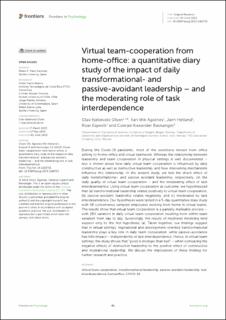| dc.contributor.author | Olsen, Olav Kjellevold | |
| dc.contributor.author | Ågotnes, Kari Wik | |
| dc.contributor.author | Hetland, Jørn | |
| dc.contributor.author | Espevik, Roar | |
| dc.contributor.author | Ravnagner, Conrad Alexander | |
| dc.date.accessioned | 2024-02-08T07:41:52Z | |
| dc.date.available | 2024-02-08T07:41:52Z | |
| dc.date.created | 2023-06-30T11:30:54Z | |
| dc.date.issued | 2023 | |
| dc.identifier.citation | Frontiers in Psychology. 2023, 14 | en_US |
| dc.identifier.issn | 1664-1078 | |
| dc.identifier.uri | https://hdl.handle.net/11250/3116278 | |
| dc.description | This is an open-access article distributed under the terms of the Creative Commons Attribution License (CC BY). The use, distribution or reproduction in other forums is permitted, provided the original author(s) and the copyright owner(s) are credited and that the original publication in this journal is cited, in accordance with accepted academic practice. No use, distribution or reproduction is permitted which does not comply with these terms. | en_US |
| dc.description.abstract | During the Covid-19 pandemic, most of the workforce moved from office setting to home-office and virtual teamwork. Whereas the relationship between leadership and team cooperation in physical settings is well documented – less is known about how daily virtual team cooperation is influenced by daily constructive as well as destructive leadership, and how intervening mechanisms influence this relationship. In the present study, we test the direct effect of daily transformational- and passive avoidant leadership, respectively, on the daily quality of virtual team cooperation – and the moderating effect of task interdependence. Using virtual team cooperation as outcome, we hypothesized that (a) transformational leadership relates positively to virtual team cooperation, (b) passive-avoidant leadership relates negatively, and (c) moderated by task interdependence. Our hypotheses were tested in a 5-day quantitative diary study with 58 convenience sampled employees working from home in virtual teams. The results show that virtual team cooperation is a partially malleable process – with 28% variation in daily virtual team cooperation resulting from within team variation from day to day. Surprisingly, the results of multilevel modeling lend support only to the first hypothesis (a). Taken together, our findings suggest that in virtual settings, inspirational and development-oriented transformational leadership plays a key role in daily team cooperation, while passive-avoidance has little impact – independently of task interdependence. Hence, in virtual team settings, the study shows that “good is stronger than bad” – when comparing the negative effects of destructive leadership to the positive effect of constructive and inspirational leadership. We discuss the implications of these findings for further research and practice. | en_US |
| dc.language.iso | eng | en_US |
| dc.publisher | Frontiers Media | en_US |
| dc.rights | Navngivelse 4.0 Internasjonal | * |
| dc.rights.uri | http://creativecommons.org/licenses/by/4.0/deed.no | * |
| dc.subject | COVID-19 | en_US |
| dc.subject | homeoffice | en_US |
| dc.subject | task interdependence | en_US |
| dc.subject | passive-avoidant leadership | en_US |
| dc.subject | transformational leadership | en_US |
| dc.subject | virtual team cooperation | en_US |
| dc.title | Virtual team-cooperation from home-office: a quantitative diary study of the impact of daily transformational- and passive-avoidant leadership – and the moderating role of task interdependence | en_US |
| dc.type | Peer reviewed | en_US |
| dc.type | Journal article | en_US |
| dc.description.version | publishedVersion | en_US |
| dc.rights.holder | © 2023 Olsen, Ågotnes, Hetland, Espevik and Ravnanger | en_US |
| dc.source.pagenumber | 1-11 | en_US |
| dc.source.volume | 14 | en_US |
| dc.source.journal | Frontiers in Psychology | en_US |
| dc.identifier.doi | 10.3389/fpsyg.2023.1188753 | |
| dc.identifier.cristin | 2159804 | |
| cristin.ispublished | true | |
| cristin.fulltext | original | |
| cristin.qualitycode | 1 | |

